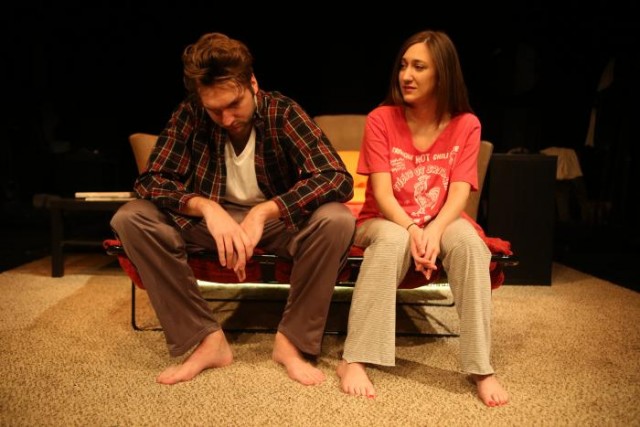
Mel (Darcy Fowler) and Djuna (Dylan Dawson) face the end of the world in postapocalyptic future (photo by Gerry Goodstein)
Ensemble Studio Theatre
549 West 52nd St. between Tenth & Eleventh Aves.
Wednesday – Saturday through March 21, $20-$25, 7:00
www.ensemblestudiotheatre.org
Playwright Chiara Atik takes audiences on a sensational romantic journey through time, from a postapocalyptic Earth to the Garden of Eden, in Five Times in One Night, one of the most thoroughly entertaining, original, and enjoyable shows I’ve seen on the subject of love in a long time. Everything about the production, part of Ensemble Studio Theatre’s Obie-winning EST/Youngblood program for playwrights under thirty, is just right, beginning with the old-fashioned freight elevator — outfitted with a bar — that brings you up to the intimate sixth-floor black-box space, where you can choose to sit on comfy couches and love seats that flank three sides of the “stage” or on folding chairs on a platform in the back. Actors Dylan Dawson and Darcy Fowler then travel across millennia in five vignettes in which their characters explore sex, love, and procreation, each story raising intriguing questions with intelligence and plenty of humor. “I’m happy! I’m happy with it. I thought this was fun! You had fun! I had fun!” Laura tells Tim in the third episode. “I fucking hate when we have to like. Have a conversation about it. Like that is so. Like it’s not sexy to talk about it, like, we don’t need to do a play by play.” But Atik and director R. J. Tolan prove that talking about it is thoroughly fun and sexy in this eighty-minute treatise on the rather complicated relationship between heterosexual men and women through the ages.

Laura (Darcy Fowler) and Tim (Dylan Dawson) examine their sex life in perhaps too much detail in FIVE TIMES IN ONE NIGHT (photo by Gerry Goodstein)
Five Times in One Night begins in 2119, as Djuna proposes that he and Mel have sex in order to try to repopulate the planet following a nuclear holocaust, but she is not so eager, a clever riff on the old adage, “I wouldn’t have sex with you if you were the last man on Earth.” In this case, Djuna is the last man on Earth, but Mel just isn’t in the mood. The time then shifts to “last week,” as Kacy and Stephen discuss an unexpected situation that has them on completely opposite sides. Next, in 1106, Heloise and Abelard exchange letters that begin as student and teacher, respectively, but lead to something more in this playful retelling of the true story of nun Héloïse d’Argenteuil and philosopher Peter Abelard. Then comes Laura and Tim, “next week,” as they delve into some hard truths about themselves after having made love. Atik saves the best for last, as a naked Adam and Eve discover themselves, and each other’s bodies, at the birth of the world. The five scenes range from the absurdist (2119) to the sublime (next week), from the serious (last week) to the hysterical (Garden of Eden), with each one sharing a little bit from all the others, resulting in ultra-smooth transitions that keep the narrative moving effortlessly despite the major shifts in era. At the end of each vignette, Dawson and Fowler go to their respective open dressing areas, where the audience can watch them change into costumes for their next pas de deux. Fowler can be seen practically bouncing with delight between scenes, her energy and charm spreading cheer and goodwill throughout the theater, while Dawson is clearly having a ball as well. Despite relatively minimal changes, Fowler and Dawson, especially the latter, are sometimes nearly unrecognizable from scene to scene, as each of the five characters they each play are very different, but they imbue them all with impressive originality; part of the fun is following these changes, watching how their performances shift as time goes back and forth, each iteration possessing unique characteristics. The small, spare set changes ever so slightly as well, with clever, resourceful uses of a fold-out couch and other furniture. The staging and acting are exceptional, but what makes Five Times in One Night really special is Atik’s perceptive, insightful dialogue, which handles a bevy of difficult, complex, at times controversial subjects with humor and grace, dodging and weaving beautifully before delivering knockout blows, preferring honesty and subtlety to cliché and status quo in this ultimate centuries-long battle of the sexes. It all comes together seamlessly in an unforgettable, wholly genuine evening of absorbing theater.